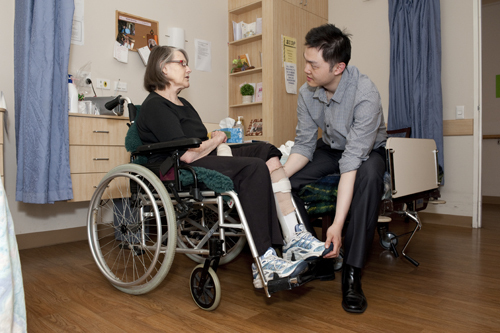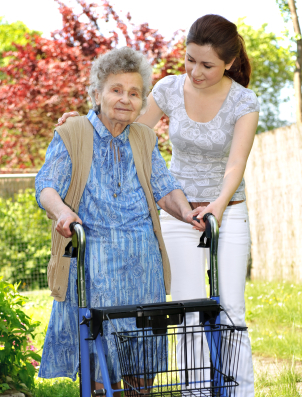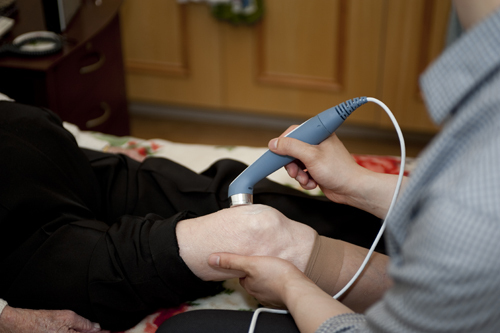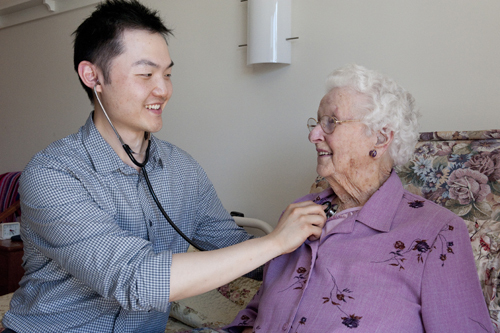CONDITIONS
TYPICAL CONDITIONS THAT WE TREAT All our staff are highly trained in anatomy, biomechanics and body function and we treat many conditions common to the elderly. Typically, each resident is thoroughly assessed for their needs for physiotherapy. As well as addressing their immediate need of symptoms relief, we also attempt to address the cause of the symptoms if applicable.
All our staff are highly trained in anatomy, biomechanics and body function and we treat many conditions common to the elderly. Typically, each resident is thoroughly assessed for their needs for physiotherapy. As well as addressing their immediate need of symptoms relief, we also attempt to address the cause of the symptoms if applicable.
Importantly, we focus on helping them regain independence by addressing their functional capacity to do everyday tasks. All of our physiotherapists adopt a rolled-up-sleeves, hands-on approach in treatments and interventions to ensure consistent great care and best possible clinical outcomes.
The most common age-related conditions seen by our physiotherapists include
Circulation Problems:
Poor circulation problems are prevalent with residents in aged care facilities, particularly those that are no longer active or with history of cardiovascular problems or diabetes. Physiotherapy can help in the prevention or management of bed sores and pressure sores with correct prescription of pressure relieving mattresses/cushions, chairs and beds. We also advise on protective wear (heel, elbow and limb protectors) as well as compression bandages (tubigrip, Jobst stockings). We encourage physical activity such as range of motion exercises and regular walking program. Massage can help promote circulation, improve lymphatic drainage, improve skin integrity and alleviate pain.
Falls and Poor Balance:
Falls are common events in the lives of older people and can result in a range of adverse outcomes, from minor bruises to fractures, disability, dependence and death. Physiotherapists can screen residents for risks of falls with the standardised Falls Risk Assessment Tool (FRAT). We assess and address their balance, gait, transfers, footwear and behavior, as well as considering their vision, nutrition, continence, psychological and cognitive function. We adopt a multi-disciplinary approach to falls prevention, working with nurses, doctors, podiatrists, dietitians, occupational therapists, families and facility managers. We can help reduce falls in a variety of ways: prescribe equipment (walking aides, sensor mats, rails, hand support bars, footwear, and restraints), promote appropriate manual handling practices, improve balance and recommend protective clothing (limb protectors and hip protectors).
Kyphotic Posture:
Often due to osteoporosis and degenerated intervertebral discs, our postures are affected as we age. Often, an elderly person will have a stooping and/or flexing posture. Although we cannot reverse the effects of aging, we can attempt to slow down or prevent further stooping. We can advise on correct sitting/walking/sleeping postures, prescribe back/neck strengthening/stretching exercises, as well as offer back support braces/cushions if required.
Movement Disorders: Human movements involve an astonishingly complex interaction of the brain, nervous system and muscles, so it's no wonder problems with movements are common in the elderly. Often, movement disorders can cause considerable morbidity and disability. Common symptoms include bradykinesia (slow movements), dystonia (sustained torsion), akinesia (no movements), involuntary movements, spasms (contractions), ataxia or tremor. Many are caused by natural progression of aging or by underlying conditions such as cerebrovascular disease and Parkinson’s disease. One of the main goals of physical therapeutic procedures in the elderly is the restoration or maintenance of functional autonomy in daily living activities.
Human movements involve an astonishingly complex interaction of the brain, nervous system and muscles, so it's no wonder problems with movements are common in the elderly. Often, movement disorders can cause considerable morbidity and disability. Common symptoms include bradykinesia (slow movements), dystonia (sustained torsion), akinesia (no movements), involuntary movements, spasms (contractions), ataxia or tremor. Many are caused by natural progression of aging or by underlying conditions such as cerebrovascular disease and Parkinson’s disease. One of the main goals of physical therapeutic procedures in the elderly is the restoration or maintenance of functional autonomy in daily living activities.
We pay particular attention to training their mobility, transfers, and fine motor skills to perform everyday tasks such as dressing, eating and toileting. We achieve this by recommending appropriate level and type of assistance, task practices, recommending assistive equipment and correct environment setups.
Pains and Aches: The aging body often experiences degeneration of muscles, tendons, joints, nerves, cartilages and other connective tissues. Many experience debilitating afflictions from soft tissue deconditioning, inflammation, strains, pains and aches. Ongoing physiotherapy treatments and pain management can assist with reducing pain, swelling and stiffness and improving vascular circulation.
The aging body often experiences degeneration of muscles, tendons, joints, nerves, cartilages and other connective tissues. Many experience debilitating afflictions from soft tissue deconditioning, inflammation, strains, pains and aches. Ongoing physiotherapy treatments and pain management can assist with reducing pain, swelling and stiffness and improving vascular circulation.
Post-Op Orthopaedic Rehabilitation:
Whether it is a total hip replacement, total knee replacement or fracture management, we can assist by settling pain and inflammation as well as implementing a rehabilitation program designed to restore the resident back to pre-morbid functional status.
Respiratory Disorders: Your lungs changes as you age. Your number of aveoli decreases, your lungs are less able to stretch to breathe, your oxygen intake decreases and your cough reflex is decreased. Often this leads to poorer tolerance to illness, poorer ability to exercise, abnormal breathing patterns, increased risk of lung infections such as pneumonia or bronchitis, and diseases caused by tobacco damage (such as emphysema or lung cancer).
Your lungs changes as you age. Your number of aveoli decreases, your lungs are less able to stretch to breathe, your oxygen intake decreases and your cough reflex is decreased. Often this leads to poorer tolerance to illness, poorer ability to exercise, abnormal breathing patterns, increased risk of lung infections such as pneumonia or bronchitis, and diseases caused by tobacco damage (such as emphysema or lung cancer).
We can offer chest physiotherapy treatments designed to improve respiratory efficiency, promote expansion of the lungs, strengthen respiratory muscles, and eliminate secretions from the respiratory system.

